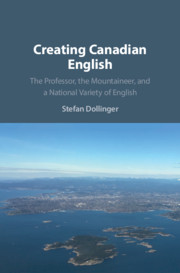Book contents
- Creating Canadian English
- Frontispiece
- Creating Canadian English
- Copyright page
- Dedication
- Contents
- Figures
- Tables
- Preface
- Acknowledgements
- A Note to the International Reader
- 1 What is Canadian English?
- 2 The Heritage of Canadian English
- 3 Avis Pulls It Off
- 4 The “Technology”: Slips, Slips, and More Slips
- 5 1967 – Excitement and Hype
- 6 Riding the Wave of Success
- 7 A Global Village and a National Dictionary War
- 8 Decolonizing DCHP-1 and DCHP-2
- 9 Is There Really a Canadian English?
- Notes
- Further Reading
- Bibliography
- General Index
7 - A Global Village and a National Dictionary War
Published online by Cambridge University Press: 24 June 2019
- Creating Canadian English
- Frontispiece
- Creating Canadian English
- Copyright page
- Dedication
- Contents
- Figures
- Tables
- Preface
- Acknowledgements
- A Note to the International Reader
- 1 What is Canadian English?
- 2 The Heritage of Canadian English
- 3 Avis Pulls It Off
- 4 The “Technology”: Slips, Slips, and More Slips
- 5 1967 – Excitement and Hype
- 6 Riding the Wave of Success
- 7 A Global Village and a National Dictionary War
- 8 Decolonizing DCHP-1 and DCHP-2
- 9 Is There Really a Canadian English?
- Notes
- Further Reading
- Bibliography
- General Index
Summary
This chapter deals with the Canadian Dictionary War of the late 1990s and early 2000s, when three excellent desk dictionaries were competing on the small Canadian market. Linguistically, in the 1990s it looked as though Canadian English would be doomed in light of competition from American English. At the same time, however, the global diversification of English and ensuing linguistic awareness had created a market for national dictionaries of English that seemed too attractive to foreign publishers to pass up, triggering a new kind of dictionary war in the Canadian context. A genuine public relations and marketing battle ensued between Oxford University Press, the newcomer, and Gage Ltd, the mainstay in Canada. In the end, unlike the American dictionary war of the mid-1800s between Webster and Worcester, which Webster won, the Canadian Dictionary War saw only losers, as all three dictionaries folded by 2008, raising the bigger question of how smaller nations might enable and support adequate language reference sources. The chapter offers a behind-the-scenes look at what makes and breaks a general desk dictionary and defines, linguistically, the notion of Standard Canadian English.
Keywords
- Type
- Chapter
- Information
- Creating Canadian EnglishThe Professor, the Mountaineer, and a National Variety of English, pp. 162 - 195Publisher: Cambridge University PressPrint publication year: 2019



